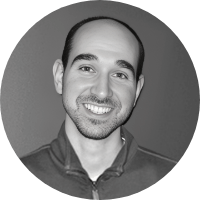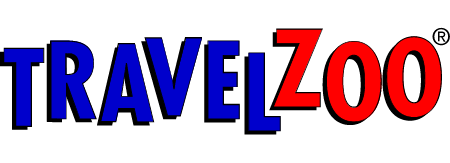The “marriage” of collaboration at Travelzoo.
On the surface, the Travelzoo website has sourced thousands of vacation offers from flights and hotels to dining experiences and excursions for every traveler’s palate. But behind the scenes, it’s the unique collaboration of the business development and editorial teams that makes sourcing and promoting these rapid-fire travel opportunities possible.
In this podcast episode, Josh Gershenson, head of sales, travel west, and Lily Fu, executive producer, talk about how their teams work in harmony to provide the best opportunities for their clients while simultaneously making the travel dreams of their members come true.
As the champion of teamwork, Adobe is changing the world through digital experiences. Empower your team to do its best work through Adobe solutions — learn how in the webinars below.
Show notes
The Power of Teamwork is brought to you by Adobe and hosted by Garrett Schwartz.
Disclaimer: The views and opinions expressed by guests are their own and their appearance on this podcast does not imply an endorsement of them or any entity they represent.
The “marriage” of collaboration at Travelzoo.
On the surface, the Travelzoo website has sourced thousands of vacation offers from flights and hotels to dining experiences and excursions for every traveler’s palate. But behind the scenes, it’s the unique collaboration of the business development and editorial teams that makes sourcing and promoting these rapid-fire travel opportunities possible.
In this podcast episode, Josh Gershenson, head of sales, travel west, and Lily Fu, executive producer, talk about how their teams work in harmony to provide the best opportunities for their clients while simultaneously making the travel dreams of their members come true.
As the champion of teamwork, Adobe is changing the world through digital experiences. Empower your team to do its best work through Adobe solutions — learn how in the webinars below.
Show notes
The Power of Teamwork is brought to you by Adobe and hosted by Garrett Schwartz.
Disclaimer: The views and opinions expressed by guests are their own and their appearance on this podcast does not imply an endorsement of them or any entity they represent.
The Power of Teamwork Season 1, Episode 3
“How Partnership Fuels Growth” — Travelzoo
Host: Garrett Schwartz, Product Marketing Manager, Adobe
Guests: Josh Gershenson, Head of Sales and Lily Fu, Executive Producer
Transcript
Josh Gershenson
You can always try to master your own role, but if you can try to master the other person’s role then you can understand their motivations. You understand what drives them.
Lily Fu
When it comes to teamwork, sometimes you gotta go through some tough stuff and some sticky situations and be willing to work it out and talk about it afterwards instead of both holding grudges about it.
Garrett Schwartz
Travelzoo is in the business of getting you out into the world. It’s a jet-setter’s dream. It offers enticing deals on vacation packages and helpful tips for traveling to far-off destinations. Each week, the sales and content teams at Travelzoo dream up new getaways and package them up for adventure.
Josh Gershenson
My name is Josh Gershenson, and I have been at Travelzoo 12 plus years, and I manage our travel sales team, sort of Chicago and West. So my title is head of business development, Travel West.
Garrett Schwartz
Josh makes sure that Travelzoo has the customer in mind. Their key targets are travelers looking for the best deals and the businesses that serve them, everything from airlines to hotels and experiences.
Lily Fu
My name is Lily Fu, and I am on the production team. I am an executive producer. I’ve been here for almost 13 years.
Garrett Schwartz
At Travelzoo, there’s a symbiotic relationship at play. Content and sales are a package deal.
Lily Fu
What the production team does is they work with our partners across the travel space, vacations, packagers, cruise lines, airlines, hotels, etc. in helping them come up with the right offer to market to our audience so that we are getting people excited and out the door exploring.
Garrett Schwartz
In this episode, Lily Fu and Josh Gershenson share how seeing a friend in your teammate can boost sales, brand loyalty, and company success.
Josh, how does Travelzoo work? What’s the company’s larger goal?
Josh Gershenson
Our goal is really to deepen the experience for our Travelzoo members. We have 30 million members worldwide and we really focus on making sure that members who click on and offer that from the onset, it is a VIP experience. It should be like, “Hey, you’re my best friend. I’m telling you about a trip to Italy. You are going to go and you’re going to thank me later.”
That is what we want for not just our best Travelzoo members. So if you book one trip with us or you book a restaurant experience or whatever it is, we want you to feel like this is something you’re going to brag to other people about. And that really kind of goes across both of our worlds.
In my world, sales tends to be more revenue-focused, but we want to make sure that we’re pulling in the right kind of revenue and also get more in touch with our members and survey them, as we do often to find out what do they want, what do they like, where do they want to go, what turned them off?
Because it’s free to subscribe to Travelzoo. It’s also free to unsubscribe.
Lily Fu
We need to make sure that we’re putting out the best content that there is and that we’re engaging our members every single day with something that they can get excited about reading. Because if it’s not engaging to them, that ultimately affects everybody, not just us as Travelzoo, but it affects our partners as well. If we can make it work for Travelzoo as well, that’s really the gold standard that we’re striving for. Without members, without them engaging with us and reading our content, we have no business, our partners have no marketing outlet either.
In terms of teamwork, we balance each other out really well. I like to joke with our partners that Josh is kind of this, you know, he’s the big bad sales guy.
When it comes to teamwork, I think Josh and I really are both servicing the client equally. We’re giving you this advice because we care about you as a company, and that’s genuinely true because a lot of what we do is also consult with them on how they can improve their business operations and how they can ultimately bring more customers through their own front door.
So I think that’s where the rubber really hits the road when it comes to teamwork between sales and production at Travelzoo.
Garrett Schwartz
You sound like the dream team for any organization. I mean, even just in technology, when we’re talking about some of the best teams that we have here at Adobe, some of our best sales reps, some of our best solutions consultants, it’s always the two that work closely together and have that information that that person would know that the other would need to do their job successfully.
Josh Gershenson
We have it where it’s like a real work wife or work husband. It’s like you didn’t clean the dishes? Well, now you’re going to hear from me. So now we have a problem. So like, in an order, it is just like my actual marriage and just like, well, his actual marriage is real. We don’t go into any day where we’re like, “Hey, you know what? I just want to make you feel so good. You’re just doing such a great job.”
I will say great things about Lily all day because you’re true. Lily will say very nice things about me. Most of them hopefully are true. But the good thing about it is that Lily will call me and say, “You know, I just don’t know if this partner is a fit for us.”
And as a salesperson, I’m like, wait, But they sign this contract or they have this setup, or we make this much money and we could do this for our members, etc. But for Lily, she knows at any moment she can call me and we can have that conversation and I can call her and be like, I think these guys are fit. What do you think? Do you think these do you think there’s a long-term life here?
And so we can have that frank conversation and step outside of our roles for a minute and really think about what’s best for everybody.
Garrett Schwartz
But you two have history together, right?
Josh Gershenson
So we went to grad school together at the same time in the same newsroom. We both are journalism grad school people, and we do not have any memories of each other in this space at all. So we both were trained exactly the same way. And at our school, in grad school, if you have one typo in any article, you get an F.
And so the standards that Lily and I had for ourselves, for each other and for our colleagues has always been very, very high because we were trained that way.
Garrett Schwartz
Is there anything specific about each of your backgrounds that helps you understand the other person’s role? Like Josh, I know that you said that you were in Lily’s field. I want to say for a couple of years. Did that help you gather an understanding of what she’s looking for?
Josh Gershenson
I can empathize with what she’s going through. Every “Top 20,” our nationwide newsletter, goes out every Wednesday morning. And when I was a producer, which is Lily’s department, I hated it when a salesperson would call me at 8:30 on a Wednesday, be like, “Hey, bro, what’s going on?” “What’s going on? I’m booking about 12 regional flights right now that I have to go out and I’m like, trying to land this plane so I can make you money. That’s what’s going on. How about that?”
So as a producer, sweating on a Wednesday morning is tough. You have to work really hard and make sure that if we stand behind every syllable of every word and every price point has to be bookable, someone’s got to book all that and test it all. And that’s the producer.
They are getting updates that airfare has changed and the headline has to change. And this client doesn’t like this photo and all that stuff. That’s something that is not part of my world at all on Wednesday mornings. So I think it helps a lot that I worked in that space because I can understand kind of the next step of the process.
I have to be careful not to step on my producer’s toes because I can say, “Hey, you know what I did when I was doing that?” So I have to be careful not to want to tell my production counterpart, in this case, Lily, “Here’s what I would do or here’s what you should do.” And I think it would be a real mistake if I were to look back and think about how I was a perfect producer, because I wasn’t. I was not a perfect producer.
I learned by making a lot of mistakes.
Garrett Schwartz
And Lily, are you just losing years of your life working with Josh, or has he been helpful in this role with you?
Lily Fu
And he takes things from my perspective a lot. It actually makes my job and complements it pretty well. But with that said, I think when it comes to just, you know, the mentality of teamwork, I think Josh and I do a very good job of getting in each other’s heads a little bit about what our respective motivations are, right?
I mean, Josh, I think is probably one of the people that keeps in mind this obligation and responsibility that we do have to our members, and communicates that very well to our partners so that we’re not in a situation where we’re just, you know, working with somebody for the sake of working for them. We really want to make sure that it works for them.
I think conversely, he gets into my head, too, and understands, okay, how is Lily evaluating this? What is she going to care about? It also helps ultimately make my job easier. We’ve been working together for so long. I think our training in journalism school, which encourages you to be curious, to ask questions, to never take no for an answer, you know, to find a way out of things or a different way of explaining things.
I think all of these things together help make us a very cohesive pair. But we have a relationship now where I think we mutually understand each other’s perspectives and where we’re coming from. And we can, almost scarily enough, sometimes fill in the blanks for each other because we know how what they’re going to say, what the other person’s going to say.
Garrett Schwartz
I think that there needs to be a new role created called like the risk mitigation sales team led by Lily and Josh. I mean, all I’m hearing is you’re avoiding these roadblocks, you’re avoiding these potholes in the sales cycle to move the deal across by working with each other and knowing what the other person’s going to think.
Now, Josh, you have this philosophy for how you see your collaborator. Is it something like the Men in Black or what? What is that story?
Josh Gershenson
Yes. So, okay, so you remember the Will Smith movie? When I was a producer, I used to think that they always pair one producer up with one salesperson. So it’s like, okay, was one of us one of them. It’s just like that movie Men in Black. So when I moved over to sales, I was like, “Oh, that’s what they do over here.”
Like, I really didn’t know what I meant. I know a little bit about it, and I thought I knew about it. And I remember when I was in production, I was like, I’m doing their job a lot. And then now that I’m over in sales, I’m like, “Yeah, I only knew probably like 10% of what that job was actually like.”
So I think it’s really important for both of us in our roles to understand what that is like. You can always try to master your own role, but if you can try to master the other person’s role, I think that’s really helpful because then you can understand their motivations. You understand what drives them.
Lily Fu
We cover for each other too. The fact that I’m not a salesperson but I understand the sales cycle enough and the things to say and how to pitch things helps me, I think, effectively support you and therefore our partner’s best by moving business along. Same with you though. If I’m not around, you know, and a client has a question about, “Hey, like what do you think about us doing this or us proposing this offer,” we’re very mindful of not stepping on each other’s toes and staying in our respective lanes.
But if you see something that’s a red flag off the bat, you’re also not afraid to say it. And I think that’s something that has also come with time as well and just learning how each other work, you know, how we need to respect each other, but where we can help support each other. I think that has also been part of our maturation process and how we’ve grown together as a team.
Josh Gershenson
I was at a giant conference once, and I don’t think I’d ever attended the conference before, and they brought in all these celebrities, the Beach Boys performing and all this stuff. And I got a text from Lily that was like, “Hey, I need your help on this. I owe this contract.” And I was like, “Oh, I’m at this conference.”
I was like, “Oh, okay, you need help? Okay, It’s urgent, it’s important, whatever it is.” So I had two paths I could choose — I could choose to pawn her off on somebody else. I could dump her off to another salesperson, or I could think about what Lily’s going through and think when I was in that role, if a salesperson was telling me he was watching the Beach Boys while I was working on a contract, I would have punched him in the face or I would have felt like it at least. So I told them I was like, “Hey, I’m going to go back to my room.” And I took a shuttle back to my room. I called Lily, we worked on the contract and then I went back to the conference. I felt so good about my decision because I supported my teammate who I care about, and it was awesome.
Garrett Schwartz
Lily and Josh have different points of view, but combine their powers to bring in a great product for their customers. Getting the right clients through the door takes a super sales team and the right content, but it’s the quality of each package that keeps members coming back. That’s what Lily and Josh want.
Lily Fu
I think part of the way we work with our different partners is kind of in two ways. You know, when we say, our audience is responding to European content very favorably. We want to increase the engagement. We’ve got a spot open for something for Italy. What can we do? What can we do that will make this particular package stand out?
That is going to be different from previous Italy packages or ones that have run most recently. So the process that Josh is describing is kind of the consultation phase where, hey, they want to do something, they want to leverage our platform to obviously bring sales to their business. What do they need to do, how do they need to look, what kind of package do they need to put together that is going to also work for our audience.
And so Josh does a lot of I think, the initial legwork when kind of talking to them and kind of feeling them out in terms of their capabilities and what they can and can’t do as it relates to the package. But then where production enters the picture is once they say, “Yes, I can do that, I can do that, hey, what do you think about this? I’’m thinking of offering this Italy vacation with these inclusions. It includes flights. It includes, you know, nine nights in four-star hotels. It includes tours in every major city you’ve got. You got six meals included as well, airport transfers, all those things.”
And what producers do then is they take that package and they evaluate it against what they’re seeing in the market from competitor packagers, or if it’s fairly easy to put together themselves like a 10-city vacation, Josh is not going to be easy for somebody to package on their own. But let’s just say it was like a Rome and Florence vacation pretty easy. You get a rental car, you get to drive between. That would be fairly simple for somebody to be able to do on their own. And so in that scenario, we would also price it against, well, if I were to a la carte this, what would it look like?
And is the package that my partner is providing us is the pricing and the inclusions and the value overall better than what I can do on my own or what a competitor packager can do. And if all those checkboxes are met, yes, yes, yes, they can do this package better than all those. And it’s showing like a very strong, compelling savings message, which we can then use to help market the deal that gets the stamp of approval from our publishers.
So producers play this role of essentially evaluating the deal. And if it’s not good enough, we also give feedback to the client saying, “Yeah, well, this is not strong enough for us to approve right now because of X, Y, or Z reasons. What can you do to make it better? Can you beef up the value by having more inclusions?”
Can you do nonstop flights instead of one-stop flights to Italy because there’s value and not having to have a layover somewhere? So those are the things that I think make us very unique. I think a lot of times they come in and look at us and they’re like, “Okay, I don’t get you and I don’t understand why you can’t just take what I’m giving you and just run it? I’m paying you all this money. Well, the truth is, if it’s not good enough, it’s just not going to work for all of us.” Which goes back to the original point I was making. We very much want to set this up where if it’s something we feel very strongly is going to work and they take our advice again, our members are happy clients.
A happy client comes back to us and works with us more. That’s really the gold standard of what we’re shooting for with all our partnerships. And so a lot of times we’d rather say to them, “Maybe it’s not now.” That’s it. Like maybe we’re saying no to you now, but it’s not known forever. It’s just not. It’s no right now.”
“We’d rather you come back to us when you’re able to put something that we have more confidence is going to work for you.” That’s frankly why our content is so strong and the kind of pressure that we have to put on it to make sure that it’s strong for our members.
Garrett Schwartz
When the pandemic hit, Travelzoo felt it. The Top 20 was one of the first things to go dark. It was a stressful time for the team, but also an opportunity for them to grow stronger together.
Josh Gershenson
We had really two very strong motivators during that period. One was we went dark on Top 20 in March 2020 and we have not stopped that Top 20 definitely as long as I have been here. But we didn’t want to be insensitive to our members when they’re worried about their health and everything. So we stopped for about three weeks and then we started up again on April 15, 2020.
We didn’t know how that would go over. We had surveyed our members a bunch to ask like, Hey, if we send out a newsletter, you’re going to be turned off, are you going to unsubscribe, etc.? So we decided we were going to move forward and send it out. That newsletter had a higher open rate on April 15, 2020 than April 2019, when everything was fine.
So what that told us was that our members were sitting at home being like, “Why are you not sending stuff? I am here, What is your deal?” So it meant that we had an audience that was waiting for us and it didn’t matter that they couldn’t get on a plane and were worried about everything else. It was like, “If I want to be depressed, I’ll watch the news. If I want to be inspired, I go to Travelzoo.”
So it was like, all right, we got it. I got to complete that part of the mission for sure. So that was very motivating. And the other one was very personal. The other one was like most businesses, we went through furloughs and that was also April 2020 — and we shrunk our sales team down quite a bit just to be kind of conservative.
And so the only thing that and on that side of it that was really driving me every hour was I’m going to get them back. I don’t care what I have to do. These are my friends. These are some of my direct reports, people I respect, I’m going to get them back. That’s all I kept saying. Like anytime somebody would talk to me, they’d be like, I don’t know if I can do it. I don’t care. We’re going to get them back.
I had an audience that wanted the content and I had people that were counting on me. And so through those two, like, I didn’t care about weekends, nights, whatever, we brought people back pretty quickly. And like, I am very proud of what we did, the people that stayed here and worked through that.
But it was an experience that I think really tested our leadership. It tested who we are and what we were able to do in such a different way. And it just I think we strengthened our relationship with our members significantly.
Lily Fu
I remember when the announcement was made about who is staying, who is going to be furloughed. There was this pressure, right, for like us, who were left to keep things floating and to do what we needed to do to get these people back. So from a teamwork perspective, I think we really had to figure out how to work closely together as a smaller group.
We were such a tight-knit group at that point. I don’t recall a time when I felt like we were all talking to each other, you know, at least a couple times a week. It was that kind of feeling. And I may work with you as my salesperson for these accounts, and I work with another salesperson on a whole other set of accounts.
This was not that it was I was talking to everybody who was left, which I can’t remember the exact number now. There weren’t that many of us, but I really liked talking to everybody almost every day, which was so unique and special. But all the while, the weight of the world was on our shoulders. You know.
Josh Gershenson
I’ll give you the other third part of that triangle really is our partners, like our tour operators or airlines. I think at that time really flipped everything upside down because if you were one of our major, major operators and you had offices all over the world, you had thousands of staff, all of that, you may have been our largest advertiser or top five advertisers before COVID.
Once COVID hit, you had all that infrastructure to deal with. You had layoffs, you had all kinds of issues. They had people that were stranded all over the place. If you were a boutique operator who has 20 agents that you can see in front of you and you don’t have offices anywhere else, and you rent this one region space and that’s it, you might become our biggest advertiser, and some did during COVID because they were incredibly nimble and be able to be like, “Hey, we didn’t shut our doors. We are rolling.”
It was really a unique time because we knew our largest operators were going through a very difficult time. So as a salesperson, to call someone and say, “Hey, can you spend money at the same time that you’re laying people off and closing your office?” We had to be very sensitive and educated about how we did it.
We got all kinds of member data and survey intelligence and what our members wanted. If we were good in our jobs pre-COVID during COVID, we had to be 10 times what we were because I had people say to me, “I just want, you know, if I do this Top 20, I’ve contracted this, I have to lay off two people so I can either keep those two people, I could do the Top 20.”
So I hope that the Top 20 works because otherwise I just laid off those two people for no reason. Like, Oh, okay, we better do this right. Our mission as an organization is to kind of grow the love of travel, really, and so like to try to keep these family run businesses open during a time of crisis with a critical mission.
Garrett Schwartz
How has the Travelzoo product gotten better because of your teamwork? Do you guys hear feedback from leadership, colleagues, customers, clients on how you two work together and collaborate as a team?
Lily Fu
I feel like our partners really appreciate us from the standpoint that we really do get to know their businesses inside and out, and we make that effort because we know that unless we do that, we’re not going to be holistically helping them. And that’s really what it’s about for us. Yes, we are a marketing and advertising channel.
You know, if you look at us on a very superficial level, what we really are is we want to strive to be true partners with them. We often say to them, you know, their success is our success to be honest with you, their failures are also our failures. So I think because we work so well together and we work together so efficiently, they see that and they frankly enjoy working with us.
Josh Gershenson
I think when I was a producer, I used to really like it when a salesperson would say to me in front of the client that I did a good job, and I really enjoyed that, even though they could have just said it privately one on one. But I liked them, reinforcing that I was important. And that I worked hard and that I worked that weekend or whatever extra praise they wanted to say about what I did because I contributed something in a significant way.
It’’s one thing to say it privately, it’s another thing to say it publicly. When I became a salesperson and worked with producers like Lily, I remember that, and I wanted to make sure that people who are putting in hours and stress and aggravation to make things just the right way, that they felt that way, too. I often try to make sure that the clients know exactly what that producer did.
I’ll be like, “Oh, man, I heard you were dealing with eight top toes this week.” We’ll be like, “Wow, you really I’m so glad you were able to fit us into your busy schedule.” That’s not me. Like hyping up Lily. That’s a fact. That’s what she did. The second thing I think is I don’t mind disagreeing with you in front of a client and we do it in a way that’s not like, “Hey, you jerk.” We do it in a way that’s, you know, somewhat professional, I think.
But I like when Lily and I are talking through something with a client and we’re talking about a potential idea, I’ll say, “Well, what if we did it this way? What do you think? Do you think that would work? Do you think we do that?” And it makes the conversation so much more about the three of us or four of us are just people on a call talking about an idea. And how do we take it to that next level rather than I’m the salesperson, I’m here to get your money, and I wish you would sign this contract because that would make me really happy because, like, that’s not a rewarding relationship because ultimately, if the client gets to be a part of that excitement and they’re like, the three of us came up with this great idea, I’m so excited about it. And then I send them the plan and the presentation and Lily gets executed. It’s like, these are not negatives. This is all great.
Garrett Schwartz
You guys have had this beautiful working relationship that seems to just get stronger and stronger with years and years and years of working with each other. So I want to ask you both, what is the best advice you’d give to struggling teammates or work collaborators? Anything that’s worked for you two, or any hurdles that you’ve overcome?
Lily Fu
I think it’s just listening to each other, trying to get into each other’s heads a little bit. Like we were saying before, I think it’s to be respectful and just open and honest. Like any relationship, you know, like, yes, this is effectively kind of like a marriage. Right? And the most successful marriages are ones where you’re willing to share feedback and share your ideas freely without fear of, you know, being judged.
I mean, I’ll admit I tend to be a little bullheaded sometimes. I think Josh knows that about me. But, you know, in talking to him, sometimes I get talked off the ledge, he’ll bring up points that I didn’t see initially. You know, I’m like, “No, no, no, we shouldn’t do this.” And he’s like, “Well, why not?”
“What if we thought about it this way?” And I’m like, “No, I don’t like that.” And then he’ll say something else that then gets me thinking, “Okay, you know what? I like that approach.” And we actually just had this happen with one of our clients where we were talking about the best way to approach them. And I said, “No, we shouldn’t run them for free. What am I going to do for them? That means they’re never going to pay for anything again.” And Josh is like, “Well, what if we do it free this time? And we just approached them about the idea of doing it for free next time. We don’t tell them we did it for free this time necessarily, but let’s use this to fulfill our needs,” which is we had a content gap that we were looking to fill for our Top 20 that week.
Josh was like, “Well, let me approach them and tell them we very well might have an opportunity to run you in the future even if you don’t have any budget right now. But what we want in exchange is just some performance data kind of thing. And I’m like, “Okay, I like that.” I like the way you’re thinking when it comes to that, but that’s what it takes.
Sometimes I feel like where we are when it comes to teamwork and just how to build that rapport is like sometimes you gotta go through some tough stuff in some sticky situations and be willing to kind of work it out and talk about it afterwards instead of both holding grudges about it. Because that’s very easy, and young Lily would have done that.
She absolutely would have held a grudge and like been talking off to the side and just like, not willing to make any compromises. But now that I’m a little bit older, I have a little bit more years under my belt. It’s like, I think you grow from those experiences.
Josh Gershenson
For me, I kind of live my life by this one. One of my favorite quotes is from Will Rogers, “It’s never judging a man until you walk a mile in his shoes.” That has served me really well because it’s so easy, it’s our default to take that person for granted. If you really have to stop and think, what are they going through and how can I help them?
You know, even to care to help them, I think it is something that’s not our natural human default. Often times, people are so self-interested. So those are two that have served me pretty well.
Garrett Schwartz
Find Lily Fu and Josh Gershenson on LinkedIn. And to learn more about the Travelzoo community, visit the Travelzoo Nation Facebook group.













